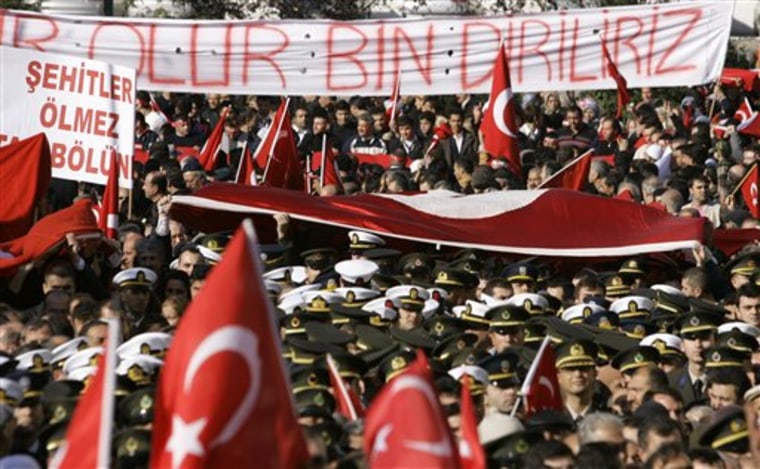When Turkey reports the death of Kurdish rebels, it calls them "terrorists" and says they were "rendered ineffective," a euphemism designed to distance Turkish troops from the brutality of killing. But the military glorifies its own dead as "martyrs."
While Turkey ponders how to attack guerrillas based in northern Iraq, it is drawing on a broad vocabulary of diplomatic and military terms in its battle with the militant Kurdistan Workers' Party.
A common goal of Turkish war talk is to portray the rebel group as illegitimate and unrepresentative of the interests of Turkey's Kurdish minority, many of whom are tired of fighting that tore apart their communities until the 1999 capture of rebel leader Abdullah Ocalan.
The PKK rebels, who abandoned a unilateral cease-fire in 2004, draw recruits from Turkey's impoverished southeast. Twenty pro-Kurdish lawmakers allegedly have close ties to militants who seek more rights and autonomy for Kurds.
Turkish pressure on the United States and Iraq to crack down on the Kurdish rebels paid off when Secretary of State Condoleezza Rice said the PKK was a "common enemy," and President Bush used similar language after a Nov. 5 meeting with the Turkish prime minister.
In practical terms, it means the United States is providing military intelligence to Turkey, possibly enabling it to conduct targeted airstrikes and pinpoint operations against PKK sites in Iraq rather than a cross-border occupation of territory that could get bogged down in winter weather and turn into a public relations fiasco.
'Incursion,' not invasion
Turkey is sensitive to suggestions that it might launch an invasion, saying instead that any operation would be an "incursion" of limited scope.
The United States and the European Union describe the PKK as a terrorist organization, based on its record of bombings and other attacks on civilians in a war that has killed tens of thousands of people since 1984. Turkish Prime Minister Recep Tayyip Erdogan reinforced the point at the National Press Club in Washington after his meeting with Bush.
"Calling them rebels or resistance fighters instead of terrorists upsets us," Erdogan said. "It's impossible to accept this."
The Turkish military seldom refers to the full name of the Kurdish rebel group or its acronym — PKK — apparently in an effort avoid any hint that it could be an adversary of stature. The term for slain guerrillas has a dehumanizing ring: rendered ineffective, or "etkisiz hale getirildi" in Turkish.
However, military officials say the term is supposed to be mild because they seek to win the support of Kurds in a "hearts and minds" campaign. Authorities used to refer to Kurds as "Dag Turku," or "Mountain Turks," as a way of denying the existence of a distinct Kurdish minority, but dropped the term in the early 1990s as fighting with rebels reached its peak and Turkey faced widespread accusations of human rights abuses.
On Nov. 4, rebels released eight Turkish soldiers who were abducted in an ambush, but the Turkish military never acknowledged they were prisoners or hostages, a status that could trigger calls for negotiations on their release.
Two definitions of 'sehit'
Turkey, which refuses to talk to the PKK, said only that communication with the soldiers had been disrupted during a clash, and the troops had "rejoined" the army. They have been charged with neglecting their duty amid speculation that they did not fight hard enough when they were ambushed; the soldiers said they ran out of ammunition.
Turkey describes its war dead as martyrs, or "sehit" in Turkish. The Arabic-based term, also used by the PKK, is associated with those who die in the belief that they are fighting for Islam, but Turkey's secular military prefers a nationalist meaning. Fighters who died during the wars that led to the 1923 creation of the Turkish republic were also given that title.
The PKK has its own war language, referring to its fighters as "heroes" and accusing Turkey of spreading rumors about rebel infighting to undermine the group. The Web site of the People's Defense Forces, the PKK's armed wing, delivers accounts of battles with Turkish forces in restrained language, though the accuracy of many reports is in doubt.
One word held dear by rebels is "Apo," the nickname for Abdullah, the first name of the rebel leader who still inspires many followers from his Turkish prison cell.
